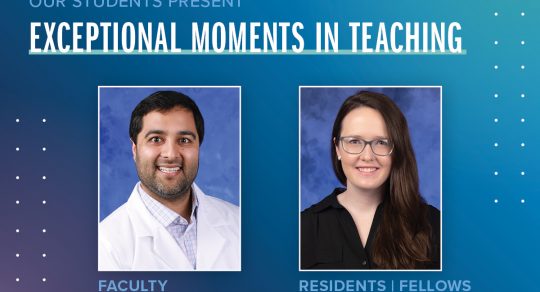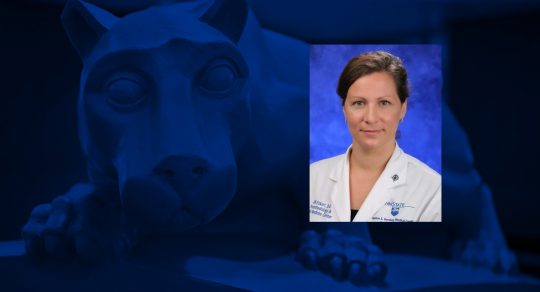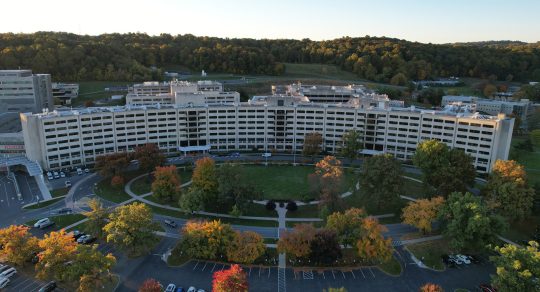Fellowship
Anesthesia Critical Care
The Anesthesia Critical Care Fellowship at Penn State Health Milton S. Hershey Medical Center is a one-year (12-month) ACGME-accredited program that admits one fellow per year.
Explore More
The Anesthesia Critical Care Fellowship endeavors to train fellows in the art and science of providing excellent, safe and compassionate clinical care to critical care patients and their families, and to foster the development of leaders in clinical and academic critical care anesthesiology.

Program Overview
Each fellow will rotate through all of the hospital’s intensive care units, including the surgical anesthesia ICU, which is the home base; the trauma unit; neuroscience ICU; medical ICU; and cardiothoracic ICU. Elective time in a vast array of disciplines such as infectious disease, nutrition and nephrology is available. The fellow will also undergo training in critical care ultrasound and a radiology educational block. The program offers three weeks of vacation and one week of CME time (meetings, etc.); additional time for presenting posters or talks may be granted on a case-by-case basis.
The program offers three weeks of vacation and one week of CME time (meetings, etc.); additional time for presenting posters or talks may be granted on a case-by-case basis.Other resources available to fellows include:
Fellows’ office space
Electronic medical record system, including anesthesia records
Online university library with electronic journals and texts
Bronchoscopy, videolaryngoscopy, ultrasound in the ICU
Physical university anesthesia library with comprehensive pediatric text collection
Learn More about the Fellowship
Eligibility
Candidates must be:
U.S. citizens, permanent residents or J-1 visa holders (no additional visa types are sponsored)
Board-eligible or board-certified in anesthesiology
Eligible for a Pennsylvania medical training license
All applicants must be graduates of an ACGME-accredited anesthesiology residency prior to beginning the fellowship. All applications must be submitted through SF Match.
Required Supporting Documents
In addition to the SF Match application, the following documents should be submitted via email to rsant@pennstatehealth.psu.edu:
Curriculum vitae
ECFMG certificate (if applicable)
ISTE scores
ABA basic exam result
Interview Process
Interviews will be conducted remotely. All fellowship applications must be submitted through SF Match. and applicants will receive further communication via the SF Match system.
Important Dates
Feb. 7, 2024: Application deadline
May 14, 2024: Rank list deadline
May 28, 2024: Match results released
Leadership


Professor and Associate Vice Chair of Research, Anesthesiology and Perioperative Medicine

Fellowship Program Coordinator, Anesthesiology and Perioperative Medicine
Penn State Anesthesiology and Perioperative Medicine
1-717-531-0826
Supporting Your Training
Curriculum Details
Fellows’ clinical experiences are based on monthly rotations in the surgical anesthesia/trauma intensive care unit, the neurosurgical critical care unit and the heart and vascular critical care unit.
The formal didactic curriculum includes bi-weekly fellow-level lectures, as well as departmental functions including Grand Rounds and Case Conferences and the Integrated Fellow's Discussion Series.
Fellows engage in a scholarly project, for which they are granted non-clinical time.
Fellows participate as teachers as well as learners. They develop and deliver lectures to our residents, and often function as junior attendings, supervising residents in the ICUs.
Clinical rotations are done in 13 four-week blocks.
Five blocks in the surgical anesthesia/trauma intensive care unit
Anesthesia ICU patients from surgical subspecialties such as orthopedics, urology, gynecology, thoracic, transplant and surgical oncology, as well as obstetrics
Trauma ICU patients from trauma and emergency general surgery as well as plastic surgery
One block in the heart and vascular critical care unit
Cardiology, vascular surgery, cardiac surgery and patients with ventricular assist devices or ECMO
One block in the neurosurgical critical care unit
Neurology, stroke and neurosurgery
One block in the medical intensive care unit
Wide array of pulmonary and medical problems as well as oncology
One block in TTE/ultrasound/general radiology (time spent with radiology and cardiology)
Focused imaging practice with subspecialty experts in addition to regular practice and instruction through the year
Three blocks of electives
Commonly in nutrition, nephrology and infectious disease, and an additional block of subspecialty ICU or research
Fellow are expected to choose areas of interest or for improvement; a customized rotation can be approved by the program director
All fellows are required to complete a scholarly project. Topics can include bench research, clinical research or quality improvement/quality assurance. The fellow will be mentored by Penn State Health Milton S. Hershey Medical Center faculty, and required to complete a deliverable (abstract, poster, manuscript, etc.). Non-clinical time is provided to the resident, approximately one academic day per week.
Each fellow is required to develop and deliver two one-hour lectures to anesthesiology residents.
Fellows are given progressive responsibility in the ICUs, as dictated by formal and informal evaluations and assessments. Toward the latter half of the fellowship, most fellows will have the opportunity to supervise residents in the ICUs. This allows opportunities to develop supervisory and teaching skills, to facilitate the fellow's transition from trainee to consultant attending.



